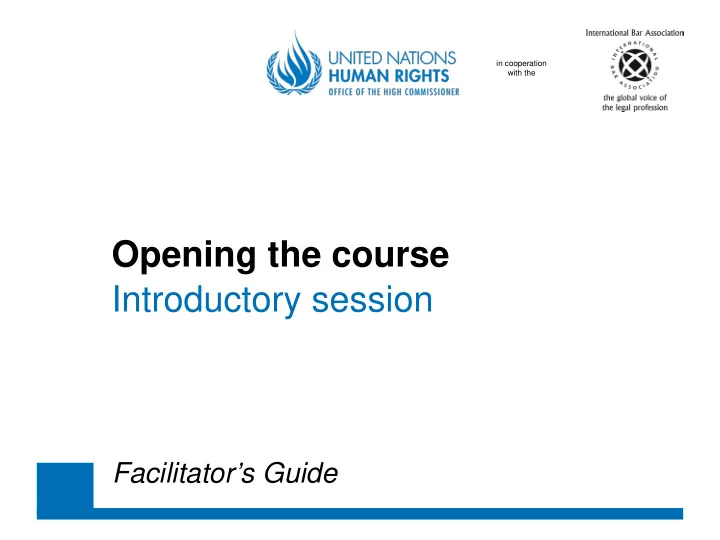

in cooperation with the Opening the course Introductory session Facilitator’s Guide
Learning objectives 1. To convey knowledge about international human rights standards relevant to the work of the participants 2. To encourage the development of the skills necessary to transform this knowledge into practical and critical analytical capacity 3. To make the participants aware of their fundamental role in promoting and protecting human rights in the exercise of their professional responsibilities Facilitator’s Guide Introductory session Computer slide No. 1
Topics covered by the course on the administration of justice I 1. International human rights law and the role of the legal professions: A general introduction 2. The major international human rights instruments and the mechanisms for their implementation 3. The major regional human rights instruments and the mechanisms for their implementation 4. The independence and impartiality of judges, prosecutors and lawyers 5. Human rights and arrest, pretrial and administrative detention Facilitator’s Guide Introductory session Computer slide No. 2
Topics covered by the course on the administration of justice II 6. The right to a fair trial: Part I – from investigation to trial 7. The right to a fair trial: Part II – from trial to final judgement 8. International legal standards for the protection of persons deprived of their liberty 9. The use of non-custodial measures in the justice system 10.The rights of the child in the administration of justice Facilitator’s Guide Introductory session Computer slide No. 3
Topics covered by the course on the administration of justice III 11. Women’s rights in the administration of justice 12. Some other key rights: The freedoms of thought, conscience, religion, opinion, expression, association and assembly 13. The right to equality and non-discrimination in the administration of justice 14. The role of the courts in protecting economic, social and cultural rights 15. Protection and redress for victims of crime and abuses of power 16. The administration of justice during states of emergency Facilitator’s Guide Introductory session Computer slide No. 4
Methodology used during this course • Collegial presentations given by professionals to professionals • Interactive training techniques, which require active participation by all • An evaluation component built in throughout the course Facilitator’s Guide Introductory session Computer slide No. 5
Introductory questions 1. Why do you want to participate in this course? 2. What do you expect from the course? 3. What can you bring to the course? 4. Can you relate a recent human rights event/ element from your own legal experience? Facilitator’s Guide Introductory session Computer slide No. 6
Recommend
More recommend